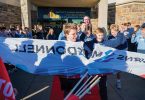
by Jan Dixon
Special to The Leaven
KANSAS CITY, Kan. — Summer has always been hard for hungry children.
Many kids in the archdiocese are dependent on free or low-cost school breakfasts, lunches and after-school meals for their basic food needs. But during the summer, when schools are closed, those meals disappear.
For these children, the answer is free summer lunch programs.
Traditionally, Catholic Charities of Northeast Kansas has run a kids summer food program yearly from June to August. The meals have been served at partner facilities and in a family- style setting with educational activities included.
Last year, they served 12,283 meals to children and youth under the age of 18.
When schools abruptly closed in March of this year as part of an effort to stop the spread of coronavirus, and daily meals were stopped early, these children were at risk of going hungry.
“Feeding America tracks child food security in the United States and in Kansas,” explained Denise Ogilvie, chief mission officer for Catholic Charities of Northeast Kansas. “And they are projecting an overall 47.6 percent increase in child food insecurity due to COVID-19.”
But Catholic Charities’ Kids Summer Food Program, directed by Josh Huston, quickly swung into action.
“We had to apply for waivers from the state and the federal government who fund the program to make changes in the service and delivery model,” Huston said. “We had to move from an on-site location where kids could congregate to an off-site mobile delivery system.”
In the past, lunches have been served at public libraries or Catholic Charities offices. Now, the Kids Summer Food Program has been using public parks and parking lots for pickup or a drive-thru system where parents pull up in their cars and workers hand them the bagged meals — enough for five days for each child.
The sack lunches for the summer program are purchased from a variety of local vendors. Each contains a protein, a whole grain, fruit and vegetable, plus milk.
Shelf-stable meals can be stored safely and for longer periods of time and make delivery to rural areas feasible. Lunches are delivered to each of the many sites once weekly.
Claire Doyle is a VISTA volunteer working at Catholic Charities of Northeast Kansas. (VISTA, which stands for Volunteer in Service to America, places volunteers throughout the United States to help fight poverty through work on community projects with organizations like Catholic Charities.) She has helped with two different food locations this summer — one at the Overland Park Food Pantry and the other at a bus route in Kansas City, Kansas. She has seen the impact the program has had on the communities and the joy it has brought to the children.
“Each week, we would try to give the kids something a little extra with their lunches, such as desserts or books,” she said. “Since the kids knew we would be visiting at the same time each week, they would wait at the window and wave to us when we pulled up or run outside to hug us and help us put lunches together.
“The summer food program gave these kids something to look forward to each week, which has been a blessing for them.”
The new system seems to be working very well. Carol Cowdrey, director of marketing and media relations for Catholic Charities, said that “to date, we have served nearly 60,000 meals. And that number is expected to climb with the start of school delayed.”
Making deliveries to numerous sites locally — as well as to several rural areas every week — has presented multiple challenges, such as feeding more children with less help from volunteers while following social distancing protocols. But the greatest challenge has been the food.
“Securing the volume of food needed has been our greatest challenge,” said Huston. “Our vendors were impacted by COVID and that made our getting food difficult.”
Because the Kids Summer Food Program is funded primarily by U.S. Department of Agriculture and the Kansas Department of Education, all lunches must meet strict guidelines requiring certain combinations of food.
“Sometimes, we could not get the right foods or could not get them on time for our deliveries,” he said.
The food program is expected to continue through Labor Day — and longer, if needed. Once schools open, Huston hopes there will be the normal transition to the After-School Meal Program, also operated by Catholic Charities.
While the need for a reliable, nutritious food source has become a major issue during COVID-19, the problem of food insecurity is not new. And the Kids Summer Food Program’s main goal always has and will remain the same.
“We must get food to kids who need food,” Huston said.
The answers to the questions of how long this public health emergency will last and how many more meals will need to be delivered are unknown. This is the landscape the food program is navigating right now.
“None of us are called to do everything, but we are called to do something,” said Ogilvie.
Jesus taught us the corporal works of mercy in Verses 31-46 in Chapter 25 of Matthew’s Gospel, she continued, and feeding the hungry is right there among them.
“The Summer Food Program is one way we can be the hands and feet of Christ and combat child insecurity in our archdiocese,” Ogilvie said.
How you can help
To volunteer, send an email to: colberding@catholiccharitiesks.org. Donations to support the Kids Summer Food Program can be sent to 9720 W. 87th St., Overland Park, KS 66212 or online at: www.catholic charitiesks.org.






